Balatro: Don’t Be Obsessed with This Poker Game
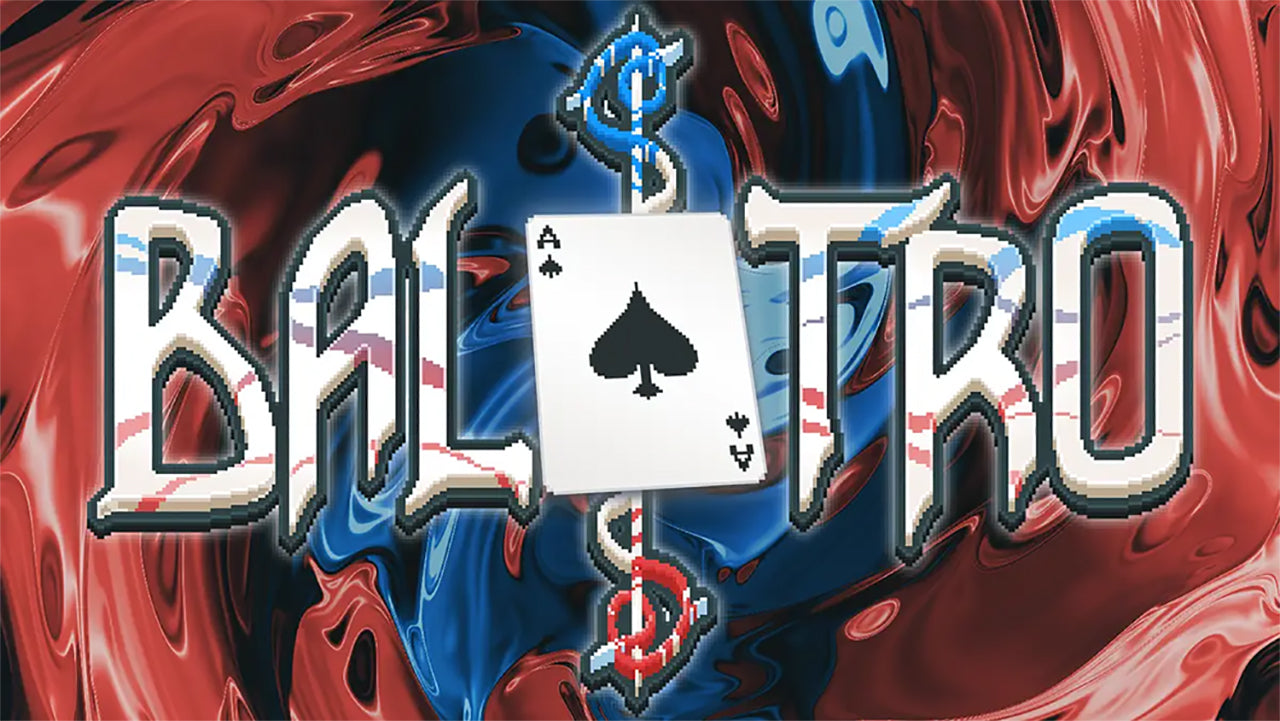
Some games are perfect weekend companions, others are a time machine for weeknights, and Balatro is one of those games that can completely swallow up your life and leave you walking in the garden with only playing cards on your mind. The four suits: clubs, diamonds, hearts, and spades. This game with poker elements may seem simple on the surface, but once you start playing, its engaging gameplay loop is hard to stop.
The entry barrier to "Balatro" is very low, but once you get into it, you will discover its complex and exquisite system. It achieves what all roguelike games strive for, creating an endless, fun-filled gameplay loop. The game is based on simple card shuffling and card type concepts, and introduces in-depth mechanics that are not boring to learn and always exciting to use.
Each round of the game consists of 8 ante bets, including the small blind, the big blind and the Boss blind. The player's goal is to reach the target score in each round of blind bets. As the game progresses, the target score will gradually increase. . Players need to draw and discard cards to combine the cards in their hands into card types that can obtain high scores.
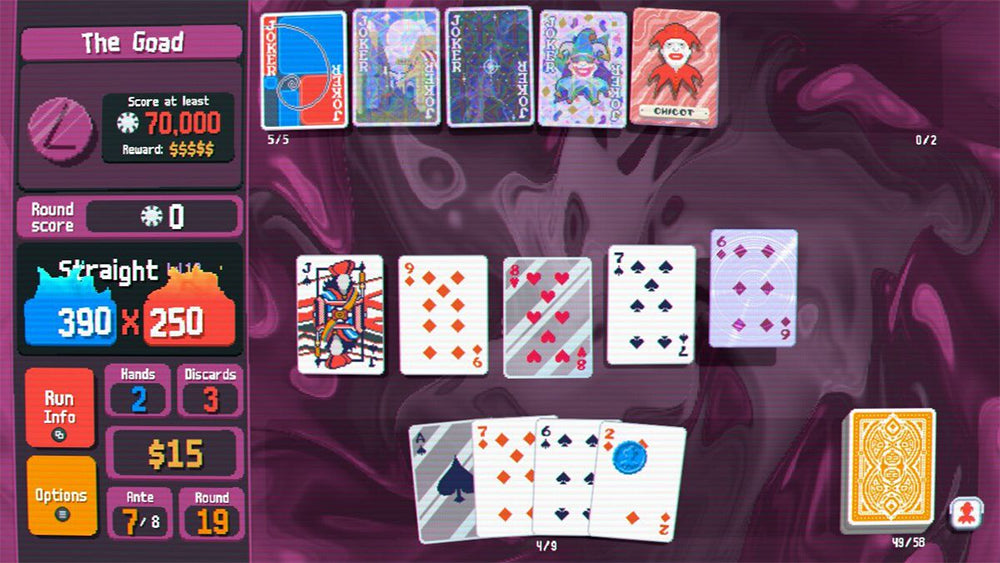
Each blind limit limits the number of times the player can play cards. If the player can reach the target score within the limited number of times, he can challenge the next blind. Between the two rounds of blind betting, players have the opportunity to upgrade or modify their decks. Although "Balatro" looks like a poker simulator, it encourages players to try boldly, challenge the limits, constantly introduce new rules at a fast pace, and also encourages players to break these rules at the same speed.
Even if they only understand the most basic poker gameplay, players can quickly get started with "Balatro" and easily modify their decks so that their preferred card types appear frequently. For example, I quickly tended to play flush cards as much as possible, so I tried to have all the cards of the same suit to make it easier to form a flush.
To do this, players need to spend their money wisely between blind rounds and hope to draw the cards they need. Of course, like all good roguelikes and real poker games, there is still an element of luck. But it is worth mentioning that "Balatro" always gives people a sense of fairness. No matter whether the situation they encounter is good or bad, it is all caused by the players themselves.
In the game, an important manifestation of luck is the opening of card packs after each round of blind betting. The faster you reach your target score, the more money your blinds will make, making it easier to revamp your deck. There are many types of card packs, each containing different effect cards that may or may not be beneficial to the player's strategy.
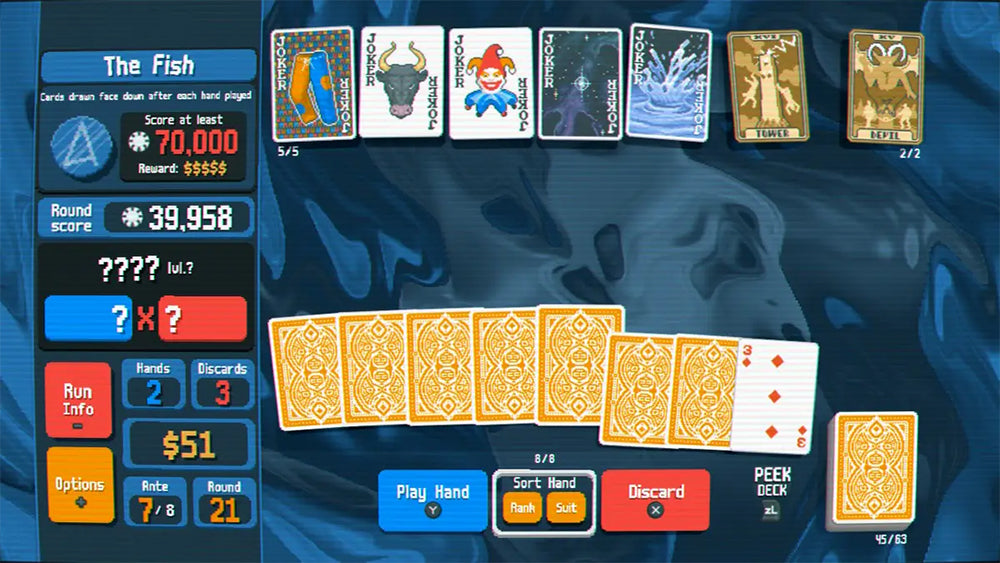
There are also many other types of cards hidden in the game, waiting for players to discover. These processes of discovery and unlocking also constitute one of the charms of "Balatro", allowing players to always discover new possibilities. Although unlocking new cards will add them to the random card pool, there is no permanent enhancement in the game that can be brought into a new round, but the collection process itself is extremely interesting and embodies the core goal of excellent roguelike games-in failure. Find fun. I never get frustrated when I lose, but instead get more eager to start a new round and enjoy watching my score keep going up.
Balatro is extremely addictive, not only because of its engaging gameplay, but also because of its background music and hypnotic rotating background graphics. Although the game's image quality isn't top-notch, its confident art design and use of old-school CRT filters add a unique, crazy beauty to the colorful graphics.
The Joker card, the core element of the game, is particularly attractive with its image of a laughing clown. Even the game name "Balatro" itself is full of meaning. In Balatro, a game with a modern design, this ancient character plays a vital role. Even though the Joker cards may look a little sinister, they are both a player's friend and the key to high scores.
The Joker card provides high multipliers and significant buffs, which can often determine the direction of the game. You might have planned to turn the entire deck into diamonds, but then you suddenly encounter a Joker card that gives you an extra 40 points for every spade played, causing your strategy to completely change midway through.
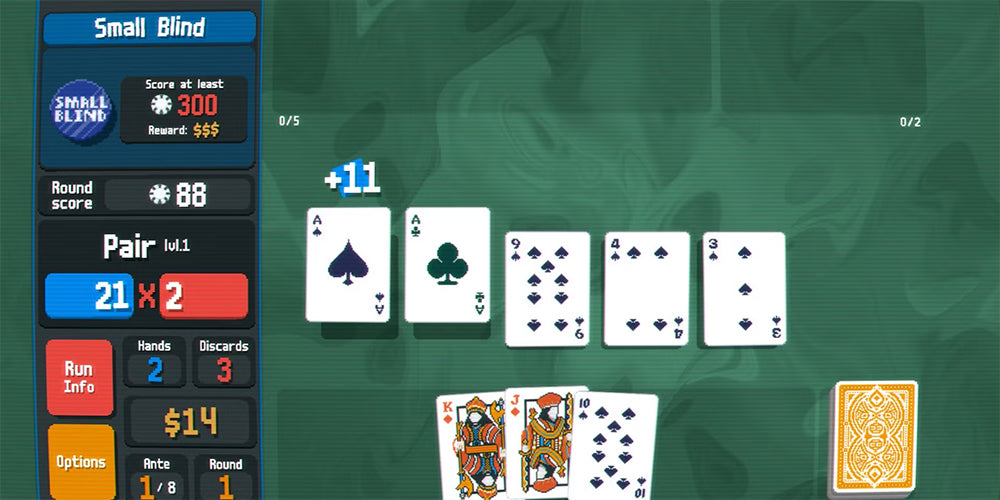
However, there are only 5 Joker card slots at the beginning of each game round, which means players must choose which Joker cards carefully and maximize their synergy. It requires a delicate balance, but once you find the right combination, it's easy to get high scores.
Eventually, this will get you through a round of Balatro, by which time you may have completed the 24 ever-increasing target scores. But the game isn't really over. You can also continue the challenge through "Endless Mode" to see how high your score can be.
One day, you will hit a bottleneck that you can't break through, but each victory with the initial deck will unlock a new deck, which will motivate you to challenge again with a new deck. Each deck has its own unique strengths and weaknesses, such as the number of cards played that affects the blinds, or the lack of certain card types in the deck. After unlocking all 15 decks, you can try higher difficulty challenges. Even players who think they have mastered "Balatro" will feel stressed in high difficulties.
Although I'm still far from that state, I've played for over 20 hours and still have a few decks to unlock. Each time I start a new round with great anticipation, imagining the new challenges I might encounter. If I had to find a fault with "Balatro", it would be that sometimes losing the game is purely due to bad luck, such as not having the item you need in the store, or not being able to draw the cards you want at a critical moment.
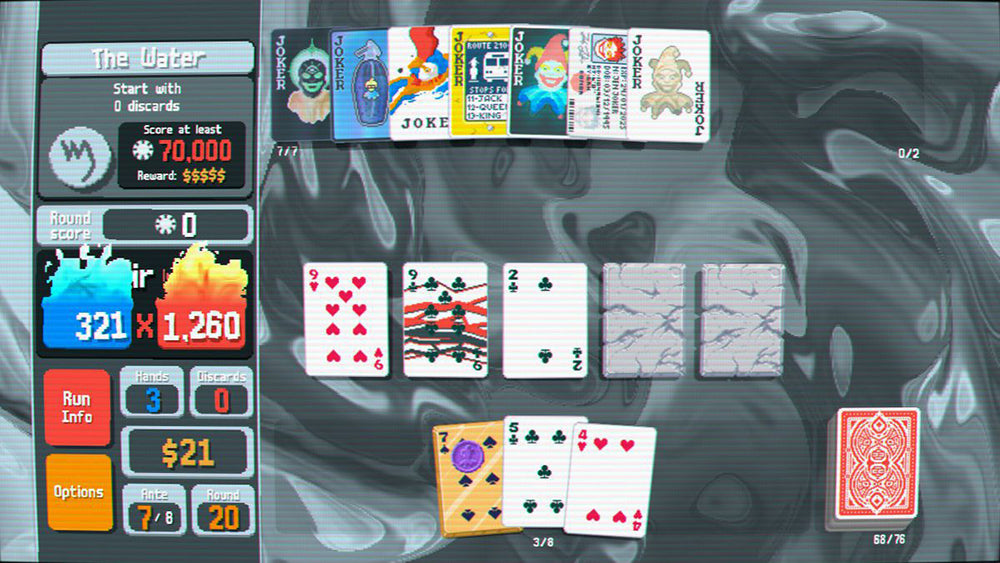
However, considering that its "parents" - poker and roguelike games - themselves rely heavily on luck, complaining about luck seems a bit far-fetched. Even the best-laid plans sometimes fail, and in Balatro, I never felt like the game was unfair. For a game that encourages "cheating", this is somewhat ironic.
"Balatro" is a deck-building game that can bring endless satisfaction to players. If you don't pay attention, you will be attracted by those tempting clown cards, thinking of playing one more game before falling asleep, but in the end, you will play without knowing it. Late at night, the whole weekend plan was thrown into disarray.
The entry barrier to "Balatro" is very low, but once you get into it, you will discover its complex and exquisite system. It achieves what all roguelike games strive for, creating an endless, fun-filled gameplay loop. The game is based on simple card shuffling and card type concepts, and introduces in-depth mechanics that are not boring to learn and always exciting to use.
Each round of the game consists of 8 ante bets, including the small blind, the big blind and the Boss blind. The player's goal is to reach the target score in each round of blind bets. As the game progresses, the target score will gradually increase. . Players need to draw and discard cards to combine the cards in their hands into card types that can obtain high scores.

Each blind limit limits the number of times the player can play cards. If the player can reach the target score within the limited number of times, he can challenge the next blind. Between the two rounds of blind betting, players have the opportunity to upgrade or modify their decks. Although "Balatro" looks like a poker simulator, it encourages players to try boldly, challenge the limits, constantly introduce new rules at a fast pace, and also encourages players to break these rules at the same speed.
Even if they only understand the most basic poker gameplay, players can quickly get started with "Balatro" and easily modify their decks so that their preferred card types appear frequently. For example, I quickly tended to play flush cards as much as possible, so I tried to have all the cards of the same suit to make it easier to form a flush.
To do this, players need to spend their money wisely between blind rounds and hope to draw the cards they need. Of course, like all good roguelikes and real poker games, there is still an element of luck. But it is worth mentioning that "Balatro" always gives people a sense of fairness. No matter whether the situation they encounter is good or bad, it is all caused by the players themselves.
In the game, an important manifestation of luck is the opening of card packs after each round of blind betting. The faster you reach your target score, the more money your blinds will make, making it easier to revamp your deck. There are many types of card packs, each containing different effect cards that may or may not be beneficial to the player's strategy.

There are also many other types of cards hidden in the game, waiting for players to discover. These processes of discovery and unlocking also constitute one of the charms of "Balatro", allowing players to always discover new possibilities. Although unlocking new cards will add them to the random card pool, there is no permanent enhancement in the game that can be brought into a new round, but the collection process itself is extremely interesting and embodies the core goal of excellent roguelike games-in failure. Find fun. I never get frustrated when I lose, but instead get more eager to start a new round and enjoy watching my score keep going up.
Balatro is extremely addictive, not only because of its engaging gameplay, but also because of its background music and hypnotic rotating background graphics. Although the game's image quality isn't top-notch, its confident art design and use of old-school CRT filters add a unique, crazy beauty to the colorful graphics.
The Joker card, the core element of the game, is particularly attractive with its image of a laughing clown. Even the game name "Balatro" itself is full of meaning. In Balatro, a game with a modern design, this ancient character plays a vital role. Even though the Joker cards may look a little sinister, they are both a player's friend and the key to high scores.
The Joker card provides high multipliers and significant buffs, which can often determine the direction of the game. You might have planned to turn the entire deck into diamonds, but then you suddenly encounter a Joker card that gives you an extra 40 points for every spade played, causing your strategy to completely change midway through.

However, there are only 5 Joker card slots at the beginning of each game round, which means players must choose which Joker cards carefully and maximize their synergy. It requires a delicate balance, but once you find the right combination, it's easy to get high scores.
Eventually, this will get you through a round of Balatro, by which time you may have completed the 24 ever-increasing target scores. But the game isn't really over. You can also continue the challenge through "Endless Mode" to see how high your score can be.
One day, you will hit a bottleneck that you can't break through, but each victory with the initial deck will unlock a new deck, which will motivate you to challenge again with a new deck. Each deck has its own unique strengths and weaknesses, such as the number of cards played that affects the blinds, or the lack of certain card types in the deck. After unlocking all 15 decks, you can try higher difficulty challenges. Even players who think they have mastered "Balatro" will feel stressed in high difficulties.
Although I'm still far from that state, I've played for over 20 hours and still have a few decks to unlock. Each time I start a new round with great anticipation, imagining the new challenges I might encounter. If I had to find a fault with "Balatro", it would be that sometimes losing the game is purely due to bad luck, such as not having the item you need in the store, or not being able to draw the cards you want at a critical moment.

However, considering that its "parents" - poker and roguelike games - themselves rely heavily on luck, complaining about luck seems a bit far-fetched. Even the best-laid plans sometimes fail, and in Balatro, I never felt like the game was unfair. For a game that encourages "cheating", this is somewhat ironic.
"Balatro" is a deck-building game that can bring endless satisfaction to players. If you don't pay attention, you will be attracted by those tempting clown cards, thinking of playing one more game before falling asleep, but in the end, you will play without knowing it. Late at night, the whole weekend plan was thrown into disarray.
